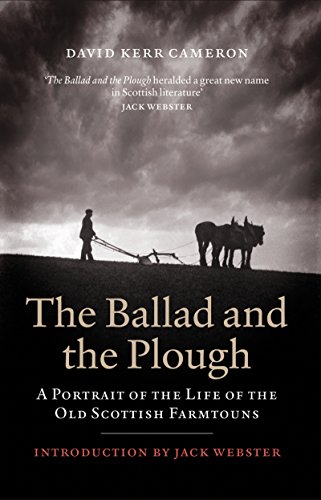
The era of the great farms of Scotland is over now. They flourished for nearly eighty years from the mid 19th century, and those years are renowned for the strength of their characters and the legendary status of their stories. Probably the finest and richest aspect of bothy life was the ballad. Often sentimental, sometimes simplistic, they nevertheless give unrivalled detail about a vanished way of life and work.
Quoting generously from the ballads, David Kerr Cameron has written a book rich in anecdote and insight. The working day was hard and long, and mealtimes consisted mainly of porridge and potatoes. Yet laughter and generosity of spirit were commonplace. For these communities, horses were as important as people, and tens of thousands of noble Clydesdales helped to cultivate the land. Ploughmen, dairymaids, bailiffs and shepherds all appear in the pages of this unique testament to the Scottish countryside. Together with Willie Gavin, Crofter Man and The Cornkister Days, this volume forms a remarkable trilogy on life in rural Scotland.
Books by David Kerr Cameron
When British servicemen were observing nuclear tests in the Pacific during the 1950s, the Prime Minister of the time, Sir Anthony Eden, was warned that they risked a lingering death from cancer. His response is reported to have been, 'A pity, but we cannot help it.'
Last night I took the old roads and heard the old speak. I listened again to the sdll voices and felt the sting of the wind on my cheek. And it was good, like a home-coming.
The old track is grass-grown, almost obliterated by the years, and I am a stranger now where the old wind wanders, where it reeshles the dry broom and tugs at the tufted grass. The hill is quiet, shorn of voices.
Time has mellowed the stones, as it has sutured the hurts of the heart; hallowed them as the last reminder of the folk who once had their life and their being here. They rest, stilled forever in their coffin'd sleep, and now on the hill nature has reclaimed her own.
McQaid is a sword - and occasionally dagger - for hire in the turbulent Highlands, as disillusionment grows against the Hanoverian regime. On a fine summer night in 1745 he is summoned to the bedside of the dying laird of Auchlour and commissioned on the most secret errand of his life ...
The year 1660 witnessed not only the restoration of the monarchy but also the beginning of a new lusty and licentious age. Under the Merry Monarch, Charles II, London shurgged off Puritanism and launched itself into debauchery to enjoy two centries of uninhibited pleasure. This richly evocative portrayal of the capital will take you on an unforgettable historical pleasure trip.
David Kerr Cameron has captured and recorded for future generations a culture and a landscape that have now gone forever
Quoting generously from bothy ballads, David Kerr Cameron has written a book rich in anecdote and insight.
With a knowledge and a skill that reveals his passion for the land and its people, David Kerr Cameron picks his way through the rural upheavals and developments of the late eighteenth and early nineteenth centuries towards the landscape we recognise today. In doing so he provides a wide-sweeping and unforgettable view of our rural history and completes his great rural trilogy portraying the old farming landscapes of Scotland's North-east Lowlands.
Colourful, boisterous and often bawdy, the old-time fairs punctuated the routine of the year like exploding stars in the firmament. They were also a vital part of England's economy. This comprehensive and readable study examines a long neglected subject and its impact on trade and everyday lives.
David Kerr Cameron was born in Aberdeenshire in 1928.
After National Service in the RAF he joined Kirriemuir Herald, a Scottish weekly, 1951. He worked at various newspapers and magazines, including the Farming Express, where he was managing editor.
In 1966 he joined the Daily Telegraph, where he was, in succession, a Features Sub-Editor, Chief Features Sub-Editor, Weekend section/Books section production Sub-Editor of both Sunday and daily pages, and finally Sub-Editor on Arts desk. He retired from the Daily Telegraph in 1993.
He never forgot the rigours of farming life in Aberdeenshire, which he wrote about with un-sentimental vividness in his books.
The Ballad and the Plough (1978), Willie Gavin, Crofter Man (1980), and The Cornkister Days (1984), all of which won Scottish Arts Council Awards, gave the social history of the North-East a readability that drew comparisons with the work of the late John Prebble.









